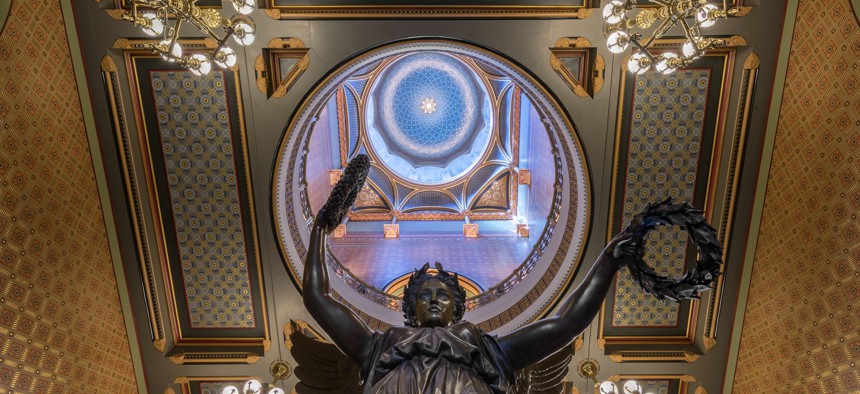Connecticut’s Job-Eliminating Budget; Statewide Rules for Uber, Lyft in Texas?

The Rotunda of the Connecticut State Capitol in Hartford. Shutterstock

Connecting state and local government leaders
Also in our State and Local Weekend Digest: Seattle survives ‘Viadoom’ closures; Kansas City’s new streetcar line; and Oregon Supreme Court’s ruling on damage caps.
HARTFORD, CONNECTICUT
BUDGET CUTS | Gov. Dannel Malloy reached a budget compromise with fellow Democrats in the state legislature that cuts government spending on everything from public health to education by $800 million. Employee costs comprise $325 million of those cuts, with 889 state employees laid off and plans to eliminate 2,500 more positions by year’s end. The $20 billion budget has a $1 billion deficit that may be closed, in part, by pulling $43.4 million from state hospitals, more than $25 million from school transportation and more than $8 million from grants for substance abuse and mental health programs. A vote on the budget is scheduled for this week, during a special session. [Hartford Courant]
AUSTIN, TEXAS
TRANSPORTATION REGULATION | After voters in Austin defeated a special ballot proposal that would have overturned municipal regulations for ride-booking services like Uber and Lyft, a Republican state senator announced that he was planning to introduce legislation that would create statewide rules for the popular transportation companies. “Texas’ ridesharing companies can no longer operate effectively through a patchwork of inconsistent and anti-competitive regulations,” according to state Sen. Charles Schwertner. [Texas Tribune]
TRENTON, NEW JERSEY
BRIDGEGATE | A 1980s-era Pennsylvania traffic ordinance banning “repetitive driving” could affect the case against two former aides to Gov. Chris Christie, charged with intentionally causing traffic jams by closing lanes from Fort Lee to the George Washington Bridge. Among the charges against Bridget Ann Kelly and Bill Baroni is a civil rights count, which accuses them of “knowingly and willfully” depriving Bergen County residents of their right to "localized travel on public roadways...” The case to strike down the Pennsylvania traffic ordinance from 20 years ago may have set a precedent for a constitutional right to interstate travel, which might come into play in the “Bridgegate” proceedings. [The Inquirer / Philly.com]
SALEM, OREGON
DAMAGES | The Oregon Supreme Court issued a 5-2 ruling Thursday, upholding a $3 million cap on the amount of damages injured people can win through lawsuits against state agencies and employees. The decision came in a case brought by the parents of Tyson Horton, who nearly died when he was 8 months old due to faulty liver surgery he underwent at a Oregon Health and Science University hospital facility. The family was awarded over $12 million after a 2013 trial in a county court. With Thursday’s ruling, that amount will drop to $3 million, which OHSU has paid. "The worst part of it is not so much the bankruptcy—we can survive that," the boy’s mother said. "The worst part is not being able to afford to care for Tyson." [OregonLive.com]
KANSAS CITY, MISSOURI
PUBLIC TRANSIT | A 2.2-mile, $100 million streetcar “starter line” had its grand opening Friday. “This has been a long and winding road,” Tom Gerend, executive director of the Kansas City Streetcar Authority, said referring to the project. Kansas City once had streetcars, which stopped running in 1957. After conducting numerous transit studies between the 1960s and 1990s, light rail proposals foundered. A local transportation authority recommended in 2009 that the city dial back plans for rail transit, which led to the new streetcar line. “This is one of the most significant milestones in this city in generations,” said Mayor Sly James. [The Kansas City Star]
SEATTLE, WASHINGTON
INFRASTRUCTURE | The Alaskan Way Viaduct, the seismically vulnerable double-decker expressway along Seattle’s downtown waterfront, reopened on Sunday five days ahead of schedule after being temporarily closed on April 29 as a precautionary measure as a tunnel-boring machine passed beneath the elevated structure. That tunnel-boring machine, called Bertha, is digging a new expressway tunnel that will replace the viaduct. The viaduct was supposed to be closed for two weeks but the work went faster than expected. The city was expecting massive traffic congestion as a result of “Viadoom,” but new traffic analysis shows that disruption did not lead to significantly longer travel times on major highways heading in and out of downtown Seattle. [KOMO-TV; Crosscut]
HUNTINGTON BEACH, CALIFORNIA
REPTILES | Members of the Huntington Beach City Council passed legislation last week that bans the use of snakes and other reptiles for entertainment purposes or raising money. While the new rules wouldn’t prevent owners from showing off their animals, a common sight downtown, it would restrict street performances and other activities that police say raises questions about safety for people downtown streets. [Los Angeles Times]
HENNEPIN COUNTY, MINNESOTA
FOUNTAINS | The troublesome-yet-iconic Government Center fountain and pool, which leaked water into the offices below, closed for $3.5 million in repairs. Crews will re-waterproof the pool, replace the glass and reinstall fountains by September, fixes which should last 30 years. Unfortunately, it’s the second time such repairs were made in the fountain’s 42-year history. [Star Tribune]

NEXT STORY: Did States Become Any Less Reluctant to Borrow Last Year?




